Research Stay
Daniel Schachingers at the IEEE International Workshop on Factory Communication Systems (WFCS) in Trondheim, Norway
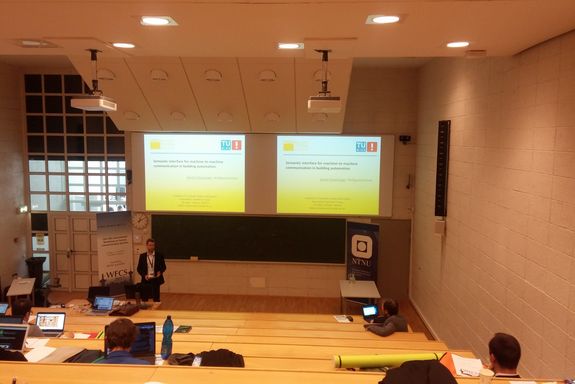
© Daniel Schachinger
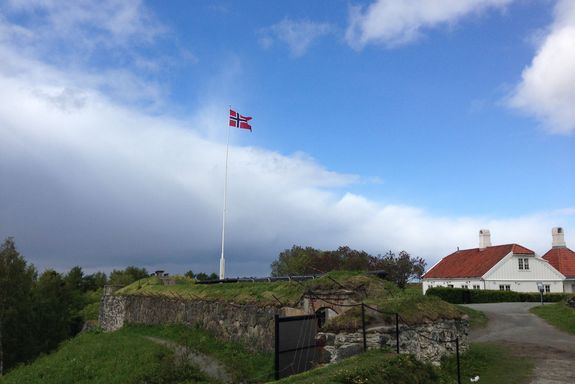
© Daniel Schachinger

© Daniel Schachinger
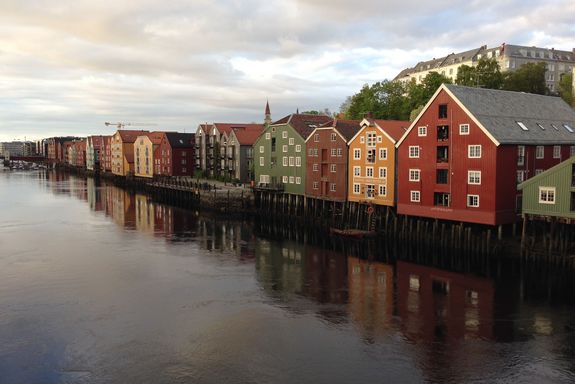
© Daniel Schachinger
Daniel Schachinger presented his conference paper "Semantic interface for machine-to-machine communication in building automation" at the IEEE International Workshop on Factory Communication Systems (WFCS) 2017 held from March 31 to June 2, 2017 in Trondheim (Norway). This publication addresses a semantic interface in accordance with the architectural requirements for machine-to-machine (M2M) communication as well as the necessary application services. The defined services provide a platform-independent data and information exchange. Communication partners model their own system and the corresponding context information in a local knowledge base, and they are able to interpret and process received information in an automatic way.
The WFCS 2017 was hosted by the Norwegian University of Science and Technology NTNU and the Norwegian research organization SINTEF. Latest scientific results in the fields of wireless networks, security, industrial communication, or architectures and industrial IoT are presented in several sessions. Two keynotes and well organized social events completed the conference program. Although it was a short stay, the most important sights of Trondheim could also be visited.
Schachingers’s research stay at the IEEE International Conference on Emerging Technologies and Factory Automation (ETFA) in Limassol, Cyprus
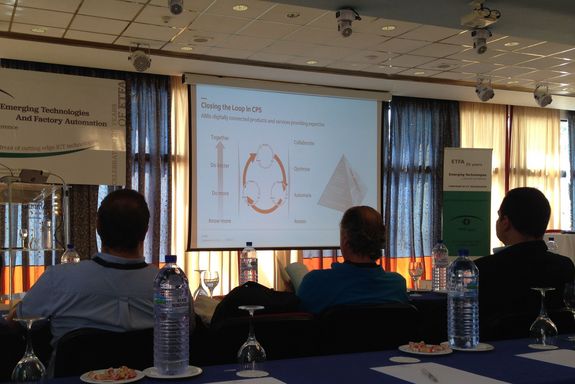
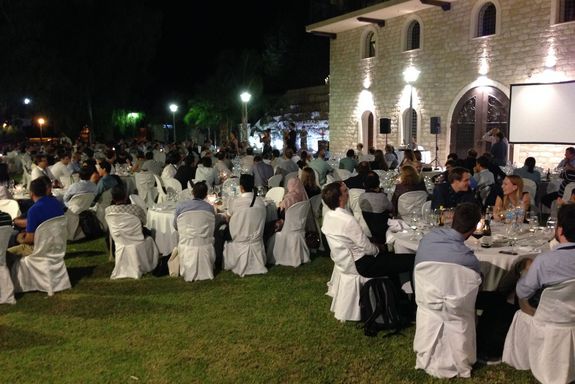
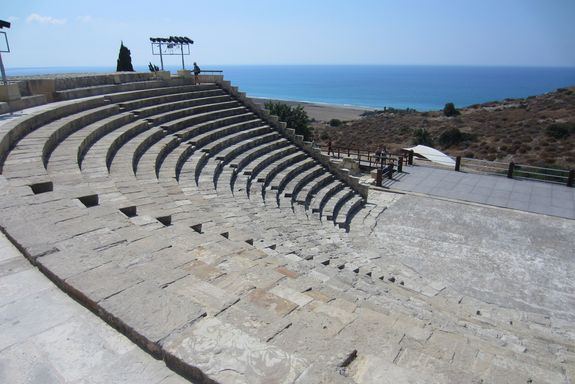
© Daniel Schachinger
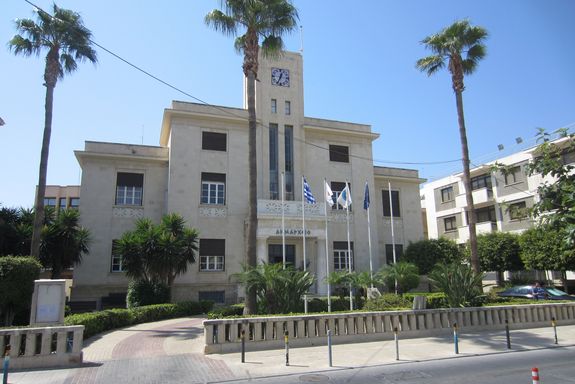
From September 12 to September 15, 2017, Daniel Schachinger was at the IEEE International Conference on Emerging Technologies and Factory Automation (ETFA) 2017 in Limassol (Republic of Cyprus). He presented his work titled "Ontology-based generation of optimization problems for building energy management" in the session "Information Technology in Automation". Moreover, Daniel Schachinger was co-chair of this session. The publication discusses the generation of optimization problems for energy management of buildings by means of a knowledge base. An objective function combines the conflicting goals of comfort maximization and energy cost minimization. The modelling of the building, the building automation, and the external influences in a knowledge base eases the generation of an optimization problem without the need of additional expert knowledge. Thus, the optimization problem can be created automatically, which increases reusability of the approach.
In up to six parallel sessions, a lot of new scientific work was presented. Moreover, keynotes and plenaries were held. A welcome reception in the pool area of the conference hotel was organized in the evening of the first conference day. On the second evening, a gala dinner at a small winery was prepared for the conference attendees.
Schachingers’s research stay at the IEEE International Conference on Industrial Electronics for Sustainable Energy Systems (IESES) in Hamilton, New Zealand
![[Translate to English:] DS](/fileadmin/_processed_/b/d/csm_Lions2017_Schachinger_ieses_1_7aa0d633c0.jpg)
![[Translate to English:] DS](/fileadmin/_processed_/2/9/csm_Lions2017_Schachinger_ieses_2_20c0274337.jpg)
![[Translate to English:] DS](/fileadmin/_processed_/7/2/csm_Lions2017_Schachinger_ieses_3_e6f3e66583.jpg)
![[Translate to English:] DS](/fileadmin/_processed_/4/1/csm_Lions2017_Schachinger_ieses_4_766852cccd.jpg)
At the University of Waikato in Hamilton (New Zealand), the IEEE International Conference on Industrial Electronics for Sustainable Energy Systems (IESES) 2018 was held from January 31 to February 2, 2018. Besides wireless power, renewable energy, microgrids, or energy storage devices, the topic of energy efficiency in buildings was part of the conference, as well. In this session, Daniel Schachinger presented the paper "Adaptive learning-based time series prediction framework for building energy management" to the audience. As an alternative to expensive engineering approaches, this work addresses a data-driven framework that supports the optimization with necessary forecast data in order to assess feasible solutions. This is based on monitoring data captured by the building automation system that are used to train neural networks.
In addition to parallel sessions for the various topics, five plenaries and keynotes were organized during the conference. The welcome reception and the gala dinner were held at the university's campus. After the conference, some more days were spent to see the scenic landscape of New Zealand.
Schachingers's research stay at the IEEE International Conference on Industrial Informatics (INDIN) 2018 in Porto, Portugal
![[Translate to English:] DS](/fileadmin/_processed_/5/6/csm_Lions2017_Schachinger_indin_1_5180ef348a.jpg)
![[Translate to English:] DS](/fileadmin/_processed_/f/3/csm_Lions2017_Schachinger_indin_2_71c2ffceca.jpg)
![[Translate to English:] DS](/fileadmin/_processed_/b/7/csm_Lions2017_Schachinger_indin_3_5376c89ed4.jpg)
![[Translate to English:] DS](/fileadmin/_processed_/f/d/csm_Lions2017_Schachinger_indin_4_1bc031a683.jpg)
From July 18 to July 20, 2018, the IEEE International Conference on Industrial Informatics (INDIN) 2018 was held at the University of Porto (Portugal). Between Wednesday and Friday, recent work following topics like "Cyber-Physical Systems", "Wireless Systems for Industrial Applications", "Factory Automation and Communication", or "Distributed and Networked Control Systems" was presented in various technical tracks and special sessions. In the track "Technologies and Infrastructures for Smart Grids, Buildings, and Cities", Daniel Schachinger presented his paper "Context-aware optimization strategies for universal application in smart building energy management" to the audience. Based on the information about the building, the building automation, or the external influences that is already modeled in an ontology, abstract and reusable strategies can be developed in order to identify suitable candidates for an optimized building automation schedule.
In addition to the technical sessions, three keynotes were held during the conference. The welcome reception on the first evening was located in a port wine cellar on the bank of the Douro river, and on the second evening, the traditional gala dinner was held.